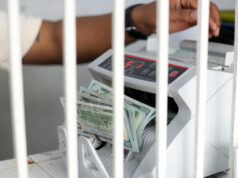‘Hot money’ flees PHL for 5th month
FOREIGN PORTFOLIO investments (FPI) fled the Philippines for the fifth straight month as investor confidence remained weak amid uncertainties brought by the coronavirus disease 2019 (COVID-19) crisis.
FPI — also referred to as “hot money” due to the ease by which these funds enter and leave an economy — yielded a net outflow of $453.17 million in July, data from the Bangko Sentral ng Pilipinas (BSP) on Thursday showed. This is the fifth consecutive month of FPI net outflow since March.
The July figure is a reversal from the $15.02-million net inflow logged a year ago. It is also nearly double the $235.38- million net outflow in June, but slimmer than May’s $1-billion outflow.
For the first seven months of the year, net outflows surged to $3.8 billion, more than five times bigger than the $706-million net outflow in the January to July 2019 period.
Uncertainty over the extent of the COVID-19 pandemic’s impact on the global economy and financial system continued to dampen investor confidence, the central bank said in a statement.
Tensions between the United States and China, as well as “corporate governance issues” involving water concessionaires Manila Water Co., Inc. and Maynilad Water Services, Inc. also weighed on sentiment, the BSP added.
For the month of July, FPI inflows totaled $719.11 million, 57% lower than the $1.68 billion last year and 29% down from June’s $1.019 billion.
Meanwhile, outflows in July amounted to $1.172 billion, a 30% decline from the $1.665 billion seen a year ago, and 6% lower than the $1.254 billion in June.
“Singapore, the United Kingdom, the United States, Bahamas, and Hong Kong were the top five investor countries for the month, with combined share to total at 84.6%,” the BSP said.
The bulk (96.5%) of the investments went into the stock market, specifically utilities companies, holding firms, real estate, banks, and retailers. The rest flowed into government securities.
The central bank projects $2.4 billion in hot money inflows this year, just nearly a third of the previous forecast of $8.2-billion net inflows penciled in November 2019.
The key to improving hot money flows is more than just reopening the economy or easing restriction measures, said UnionBank of the Philippines, Inc. Chief Economist Ruben Carlo O. Asuncion.
“A more fundamental improvement in FPI would entail more ‘confidence’ in the government’s efforts at virus containment and how the government responses, through monetary and fiscal policies, are being effectively carried out,” he said in an e-mail.
The Philippines has the most number of COVID-19 cases in Southeast Asia, with 205,581 infections as of Tuesday.
Rizal Commercial Banking Corp. Chief Economist Michael L. Ricafort said the passage of timely legislative measures such as the Bayanihan to Recover as One Act (Bayanihan II) and the CREATE (Corporate Recovery and Tax Incentives for Enterprises Act) bill will stimulate economic activity and boost investor sentiment.
The Bayanihan II, a P165-billion stimulus program to respond to the pandemic, is awaiting President Rodrigo R. Duterte’s signature. Meanwhile, the CREATE bill, which will immediately slash corporate income tax to 25% from 30% is still pending in the Senate. — Luz Wendy T. Noble



